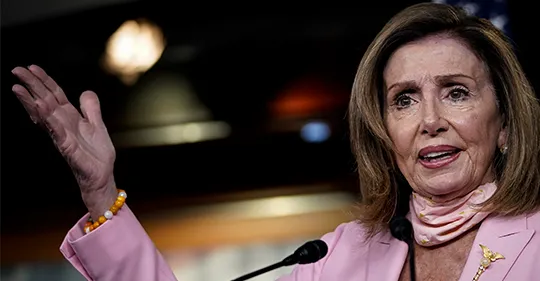Pelosi joins AFSCME in calling for state, local aid amid soaring virus cases

House Speaker Nancy Pelosi on Thursday joined AFSCME President Lee Saunders and front-line public service workers from states experiencing surges in coronavirus cases to urge the Senate to approve at least $1 trillion in flexible aid to states, cities and towns.
The much-needed aid would make it possible for communities across America to continue to provide essential public services such as clean water, trash pickup, public education, emergency health care and more. It would also help state and local agencies provide front-line public service workers the personal protective equipment (PPE) they need to do their jobs safely.
“As coronavirus cases continue to spike, with no end in sight to this crisis, we need AFSCME members on the job more than ever,” President Saunders said. “The demand for public services is more urgent than ever. But with the economy thrown into a state of chaos, with the tax base eroding and revenue drying up, state and local governments are confronting devastating, historic budget shortfalls.”
Pelosi praised front-line heroes and AFSCME members who have been working nonstop since the pandemic began, often at great risk to themselves and their loved ones.
“We are not worthy of praising our front-line heroes until we do everything possible to support them,” she said.
Referring to the HEROES Act, which the House passed two months ago, Pelosi said.
“It’s about the work they [front-line heroes] do and the needs they have and the urgency with which we must act,” the California lawmaker said.
She called the Trump administration’s response to the pandemic “a failed response,” adding that the federal government’s failure to do its job “means you [front-line heroes] are forced to risk your lives to protect lives, and now you might lose your jobs.”
The Senate left Washington last week for a two-week recess without taking up the HEROES Act, which delivers urgently needed aid to maintain essential public services, or proposing an alternative. Each day the Senate delays on an aid package, public service workers who risk their lives to beat the pandemic and safely reopen the economy are being thanked with pink slips.
AFSCME members from states experiencing surges in coronavirus cases were on the press call. They were Rene Sanchez, a trauma operating room technician at Jackson Memorial Hospital in Miami and member of AFSCME Local 1363; Keith Lowry, a paramedic serving rural communities in Arizona and member of AFSCME Local 2960; and Tanisha Woods, a correctional officer at the Texas Department of Criminal Justice’s Dr. Lane Murray Unit, Gatesville, and president of AFSCME Local 3920.
They all urged the Senate to approve at least $1 trillion in aid to states, cities and towns.
“I invite any elected leader to come work the night shift and find out what it is like to be covered in sweat after caring for 10 or even 16 patients on ventilators,” said Sanchez.
“I invite them to see how your co-workers huddle together over short breaks of nothing but ginger tea to stave off hunger because you are afraid of touching food once you put on your PPE. I invite them to learn what it feels like to fear of walking into the hospital in normal clothing, unprotected, until you reach your work area where a shift nurse gives you the one N95 mask you will wear for the whole day, even though pre-COVID guidelines said you should replace it after four hours,” Sanchez said.
Woods said the federal government needs to do more to help state and local governments protect their essential workers.
“To be able to protect everyone in the prison, both staff and offenders need to be properly resourced to stay safe and healthy,” she said. “It’s not only on the state to make sure we have enough gloves, masks, soap and cleaning supplies, but we need the federal government to step up and provide the necessary direct funding we need to maintain services and keep public services workers who are leading the fight against this virus on the job.”
Lowry said demand for essential public services like those he provides is skyrocketing amid the worsening pandemic.
“We will never be able to control the coronavirus if first responders don’t have the PPE they need to stay safe on the job,” he said. “And we won’t be able to fight this virus if we lay off and furlough first responders, which happened in Maricopa County before we saw cases spike. Without the aid, the cuts and layoffs will come at a time when demand for life-saving services is skyrocketing.”
Without federal aid to states, cities and towns, economists predict a prolonged depression. They say approving such aid at the federal level is a no-brainer since every dollar invested in public services will yield $1.70 in economic activity.
Business leaders, including the U.S. Chamber of Commerce, have called on Congress to pass the aid. Eighty-four percent of Americans support such it, including a majority of residents of Kentucky, the home state of Senate Majority Leader Mitch McConnell.
“The economy has hemorrhaged 1.6 million public sector jobs in the last few months – just for a little perspective, that’s three times more than were lost during the entire Great Recession a dozen years ago,” said Saunders. “We will remain on the chopping block unless Congress comes through with a robust package of aid – at least a trillion dollars’ worth – to states, cities and towns across the country.”
